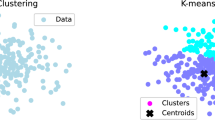Abstract
Manifold learning algorithm is that the local optimum gradually approaches the global optimum, especially the complicated manifold learning problem used in big data dimensionality reduction needs to find an optimization method to adjust k-nearest neighbors and extract dimensionality. Therefore, we intend to use the constrained particle swarm multi-objective optimization algorithm to solve the constrained multi-objective optimization problem model composed of multi-information objectives and multi-user requirements (constraints), and the design is based on the Lebesgue measure constraint processing technology particle swarm Manifold learning algorithm of multi-objective optimization algorithm to improve the calculation accuracy of popular learning algorithms.
Access this chapter
Tax calculation will be finalised at checkout
Purchases are for personal use only
Similar content being viewed by others
References
Maaten, L., Postma, E., Herik, J.: Dimensionality reduction: a comparative review. Rev. Liter. Arts Am. 10(1), 66−71 (2009)
Zebari, R.R., Abdulazeez, A.M., Zeebaree, D.Q., et al.: A comprehensive review of dimensionality reduction techniques for feature selection and feature extraction. J. Appl. Sci. Technol. Trends 1(2), 56–70 (2020)
Becht, E., et al.: Dimensionality reduction for visualizing single-cell data using UMAP. Nat. Biotechnol. 37(1), 38–44 (2019)
Ayesha, S., Hanif, M.K., Talib, R.: Overview and comparative study of dimensionality reduction techniques for high dimensional data. Inf. Fus. 59, 44–58 (2020)
Nguyen, L.H., Holmes, S.: Ten quick tips for effective dimensionality reduction. PLoS Comput. Biol. 15(6), e1006907 (2019)
Luo, F., et al.: Dimensionality reduction with enhanced hybrid-graph discriminant learning for hyperspectral image classification. IEEE Trans. Geosci. Remote Sens. 58(8), 5336–5353 (2020)
Sadiq, M.T., Yu, X., Yuan, Z.: Exploiting dimensionality reduction and neural network techniques for the development of expert brain–computer interfaces. Expert Syst. Appl. 164, 114031 (2021)
Martino, C., et al.: Context-aware dimensionality reduction deconvolutes gut microbial community dynamics. Nat. Biotechnol. 39(2), 165–168 (2021)
Capelli, R., et al.: A data-driven dimensionality reduction approach to compare and classify lipid force fields. J. Phys. Chem. 125(28), 7785–7796 (2021)
Fan, Y., et al.: Manifold learning with structured subspace for multi-label feature selection. Pattern Recogn. 120, 108169 (2021)
Zhao, D., et al.: Sentence representation with manifold learning for biomedical texts. Knowled. Based Syst. 218, 106869 (2021)
Shires, B.W.B., Chris, J.P.: Visualizing energy landscapes through manifold learning. Phys. Rev. X 11(4), 041026 (2021)
Zhang, X.H., et al.: Novel manifold learning based virtual sample generation for optimizing soft sensor with small data. ISA Trans. 109, 229–241 (2021)
Tan, C., Ji, G., Zeng, X.: Multi‐label enhancement manifold learning algorithm for vehicle video. Concurr. Comput. Pract. Exper. e6660 (2021)
Chen, X., Chen, R., Wu, Q., et al.: Semisupervised feature selection via structured manifold learning. IEEE Trans. Cybern. 6(5), 1–11 (2021)
Rezaei-Ravari, M., Eftekhari, M., Saberi-Movahed, F.: Regularizing extreme learning machine by dual locally linear embedding manifold learning for training multi-label neural network classifiers. Eng. Appl. Artif. Intell. 97, 104062 (2021)
Acknowledgement
This work was supported by Characteristic innovation projects of Department of Education of Guangdong Province under No. Grant KJ2021C014 and Science and Technology Ph.D. Research Startup Project, China (SZIIT2022KJ001).
Author information
Authors and Affiliations
Corresponding author
Editor information
Editors and Affiliations
Rights and permissions
Copyright information
© 2022 Springer Nature Singapore Pte Ltd.
About this paper
Cite this paper
Wang, H., Cai, T., Wang, Y., Yang, G., Liang, J. (2022). Manifold Learning Algorithm Based on Constrained Particle Swarm Multi-objective Optimization. In: Li, K., Liu, Y., Wang, W. (eds) Exploration of Novel Intelligent Optimization Algorithms. ISICA 2021. Communications in Computer and Information Science, vol 1590. Springer, Singapore. https://doi.org/10.1007/978-981-19-4109-2_8
Download citation
DOI: https://doi.org/10.1007/978-981-19-4109-2_8
Published:
Publisher Name: Springer, Singapore
Print ISBN: 978-981-19-4108-5
Online ISBN: 978-981-19-4109-2
eBook Packages: Computer ScienceComputer Science (R0)





